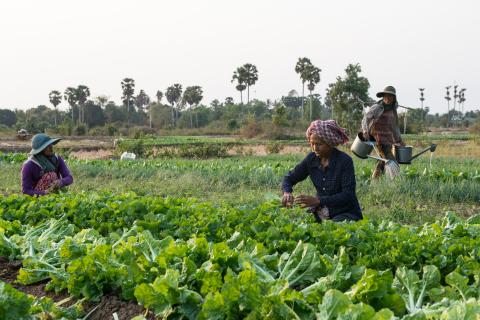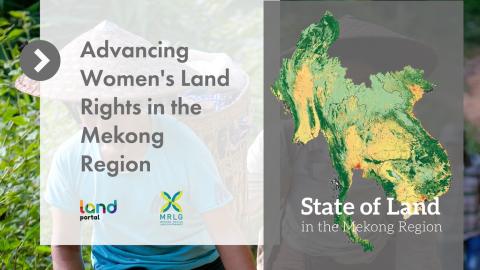Discover hidden stories and unheard voices on land governance issues from around the world. This is where the Land Portal community shares activities, experiences, challenges and successes.
 Follow our
Follow our
Sustainable Development Goals
Blog Series!
Interested in land corruption?
Follow our Land & Corruption Blog Series
for in-depth perspectives from the experts.
Issues
Geographical focus
This blog post from Transparency International and the Land Portal is a small preview of the discussion we're co-organizing at the World Bank Land Conference next month. The focus is on moving from awareness to action with strategies to secure land tenure and access, while scaling up initiatives, investments, and policy reforms for climate change mitigation and adaptation - including tools to monitor transparency and corruption.
On January 23, 2025, the Land Portal Foundation and Mekong Region Land Governance (MRLG) convened a webinar to explore the evolving landscape of agricultural investments in the Mekong region. Experts from various sectors joined to discuss the impact of industrial crops, smallholder farmer integration into transnational value chains, and the resulting economic, environmental, and social transformations.
Photo: Kandukuru Nagarjun, via Flickr, CC BY 2.0
The recent series of ALIGN articles shed light on how civil society, impacted communities and rights defenders across the world have used strategies such as legal action, publishing of mining contracts and stakeholder dialogues to change approaches to land-based investment governance.
The webinar “Pathways to Customary Land & Forest Rights in the Mekong” took place on July 2nd, 2024. This was the second webinar in the series ‘State of Land in the Mekong region’ which aims to highlight the evolving environment of land governance in this dynamic region, including Cambodia, Lao PDR, Myanmar and Vietnam. The webinar attracted 240 participants and featured experts from the Mekong region.
Photo: A train traveling through a lush green forest by Ally Griffin (Unsplash License).
By Alice Stevens & Anoukh de Soysa
A Recap of the Recent Land Portal-MRLG Webinar on Gender Equitable Land Governance in the Mekong Region
On Thursday 15 February, the Mekong Region Land Governance (MRLG) project and the Land Portal launched the first webinar in the State of Land in the Mekong series. The series, which will consist of three webinars across 2024 and 2025, aims to shine a spotlight on land issues in the Mekong region during a time of immense rural transformation.
This webinar took place on February 15th, 2024, under the title “Women’s Participation in Land Governance in the Mekong : Moving Beyond Quotas to Meaningful Inputs and Influence”. The webinar featured panelists from researchers to youth representatives and was jointly organized by the Land Portal Foundation and Mekong Region Land Governance (MRLG).
Sr. Elizabeth Daley, Independent freelance consultant and Chair of the Land Portal Foundation, moderated the panel, which featured the following speakers:
Cambodia’s new investment law could open the way for more inclusive, sustainable investment. In a series of virtual meetings, stakeholders from across Cambodia came together to assess the challenges and opportunities arising from that law and investment governance generally.
The Land Portal advocates for more and better open land data, but more and better have never been our end objectives. Data must be used; it needs a purpose. One of the ways we practice what we preach is through our data stories.
Maize is a key global cash crop, produced in every continent except Antarctica. As a flex crop, it has multiple uses including for direct human consumption, as an ingredient for animal feed, as a key component in processed foods, or in ethanol production. According to figures from FAOSTAT, global production increased from 0.2 to 1.2 billion tons between 1961 and 2020.
Since the turn of the century, 27,000 km2 of land in Cambodia has been deforested. This is 14.8% of total land area in the country. It also represents 26.4% of forest cover as existed in 2000.
An acceleration in deforestaton is seen from the early 2000s to 2010. For the land‐grab aficionado, the trend runs parallel to the ‘global land rush’ and mirrors the evolution of agricultural commodites prices.








